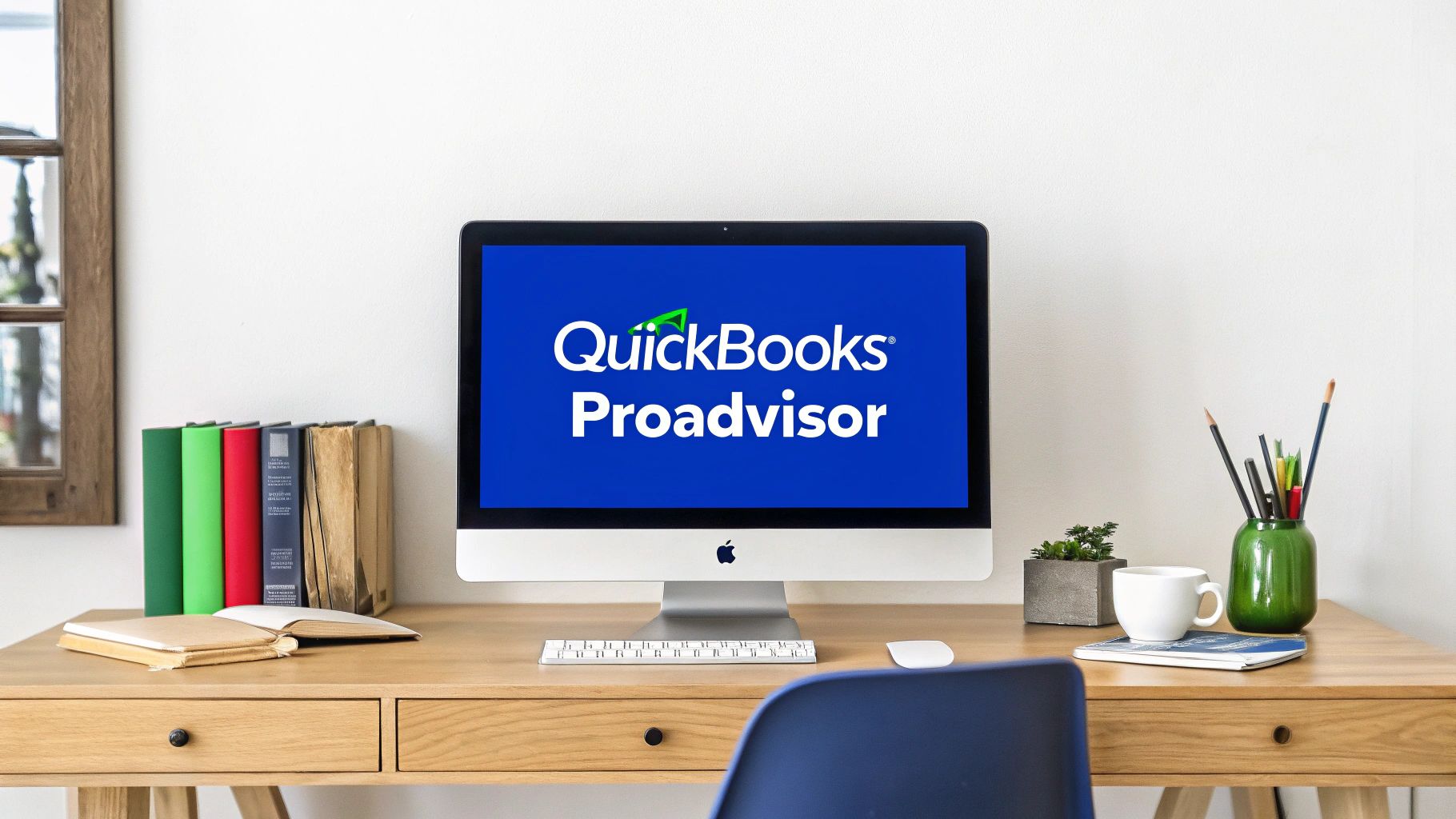The financial backbone of any successful business, large or small, is meticulous and accurate bookkeeping. The modern bookkeeper's role has evolved far beyond simple data entry; it requires a sophisticated blend of formal education, professional certifications, and technical prowess. Whether you are an aspiring financial professional aiming to start a career or a business owner looking to hire, understanding the key qualifications for a bookkeeper is the first step towards success. This guide provides a detailed roundup of the most critical qualifications, offering a clear roadmap for what it takes to excel in this vital profession.
This article organises the essential credentials into a clear, actionable list. We will explore the foundational requirements and advanced specialisations that define a top-tier bookkeeper in today's market. For those ready to begin their professional development, you can explore a wide range of bookkeeping courses and qualifications designed to build these core competencies from the ground up. By outlining what truly matters, this list will help you identify the right skills for your business or build the ideal profile for your career. Let's delve into the essential building blocks of a successful bookkeeping journey.
1. Foundation First: A-Levels or Equivalent
Before diving into specialised bookkeeping certifications, a solid educational foundation is a crucial first step. In the UK, A-Levels or their vocational equivalents, such as a BTEC National Diploma, are widely recognised as the baseline qualification for bookkeeper roles. This level of education demonstrates a candidate's proficiency in core skills essential for the profession: strong numeracy for accurate calculations, literacy for clear communication and report writing, and analytical thinking for problem-solving.

While any A-Levels show a level of academic ability, certain subjects give aspiring bookkeepers a distinct advantage. Strong passes in Maths, Business Studies, or Economics are particularly valuable. They provide direct, relevant knowledge that translates seamlessly into understanding financial principles, business operations, and economic contexts that influence a company's financial health. These qualifications signal to employers that a candidate has the fundamental aptitude required to manage financial data with precision and care.
Practical Application and Next Steps
This foundational knowledge opens doors to various entry-level positions where you can gain practical experience. These roles are often the first rung on the accounting ladder.
- Entry-Level Roles: Small local businesses often seek individuals with solid A-Levels to manage daily transactions as an entry-level bookkeeper.
- Specialised Clerk Positions: Larger firms may hire for accounts payable or receivable clerk roles, where you handle specific aspects of the bookkeeping cycle.
- Trainee Programmes: Many companies offer junior accounting assistant or trainee positions designed for individuals with A-Levels who are eager to learn on the job and pursue further professional qualifications.
Key Insight: Employers view strong A-Level results not just as academic achievements, but as evidence of the discipline, numeracy, and attention to detail required for handling sensitive financial information. These foundational qualifications are a key part of the UK pre-employment screening process for finance roles.
For those considering alternative pathways to gain these essential qualifications, exploring options like A Level Distance Learning can provide the flexibility needed to study while managing other commitments, such as part-time work. This route allows you to build the necessary academic foundation at your own pace before moving on to professional bookkeeping certifications.
2. Associate Degree in Accounting or Business
For those seeking a more comprehensive and structured educational path, an associate degree in accounting, business administration, or a related field offers a significant step up from foundational A-Levels. This two-year programme provides a deep dive into the core principles that govern the world of finance, making it a highly respected qualification for bookkeeper roles. It goes beyond basic numeracy and literacy, delivering specialised knowledge in accounting principles, business law, financial management, and ethics.

This level of study is designed to bridge the gap between secondary education and professional practice. It equips candidates with a thorough understanding of the entire accounting cycle, from recording transactions to preparing financial statements. An associate degree signals to employers that an individual has committed to the profession and possesses a robust theoretical framework that underpins practical bookkeeping tasks. Courses often include Managerial Accounting, Financial Accounting, and Business Mathematics, providing the specific skills needed to analyse and interpret financial data effectively.
Practical Application and Next Steps
An associate degree unlocks a wider range of opportunities and often leads to positions with greater responsibility and higher earning potential. The structured learning provides a solid base for more complex roles.
- Full-Charge Bookkeeper: Medium-sized companies often prefer candidates with an associate degree for full-charge bookkeeper positions, where one person manages all the company's books.
- Government Accounting Roles: This qualification meets the requirements for many accounting clerk and technician roles within local and central government agencies.
- Supervisory Positions: In larger organisations, such as retail chains or hospitality groups, an associate degree can be a prerequisite for bookkeeping supervisor roles that involve overseeing a team of clerks.
Key Insight: An associate degree demonstrates more than just academic knowledge; it shows a commitment to the accounting profession. Employers see it as a strong indicator that a candidate has the discipline and in-depth understanding required to manage complex financial records and progress within a finance team. This is a key differentiator among other qualifications for bookkeeper applicants.
To maximise the value of this degree, aspiring bookkeepers should be proactive. Focus on programmes that offer practical training in widely used software like QuickBooks and Xero. Seek out internships or work placements during your studies to gain invaluable real-world experience. Networking with professors and peers can also be a powerful tool for discovering job opportunities and building a professional support system early in your career.
3. QuickBooks ProAdvisor Certification
Beyond foundational qualifications and professional memberships, proficiency in specific accounting software is a non-negotiable requirement in today's digital-first landscape. The QuickBooks ProAdvisor certification, offered directly by Intuit, stands out as a critical credential. It validates an individual's expertise in using QuickBooks, which is the dominant accounting software for small and medium-sized enterprises (SMEs) in the UK and globally. Achieving this certification signals to employers and clients that you are not just familiar with the software but are highly competent in leveraging its full suite of features for effective financial management.

This free online training and certification programme covers everything from setting up a company file and managing daily transactions to running complex reports and troubleshooting common issues. For bookkeepers, this qualification is particularly powerful because it directly aligns with the tools used by a vast majority of potential employers and clients. Holding a QuickBooks ProAdvisor certification demonstrates a practical, job-ready skill that requires minimal on-the-job training, making you a more attractive and efficient hire from day one.
Practical Application and Next Steps
This certification is immensely valuable for bookkeepers in various professional settings, serving as a direct testament to your technical capabilities.
- Freelance Bookkeepers: A ProAdvisor certification is a powerful marketing tool, allowing you to attract and serve a wide range of small business clients who rely on QuickBooks.
- In-house SME Roles: Companies using QuickBooks for their internal accounting will prioritise candidates who are certified, ensuring seamless integration into their finance team.
- Accounting Firm Employees: For bookkeepers working in practices that serve multiple SME clients, this certification is often a core requirement for managing client accounts efficiently.
Key Insight: The ProAdvisor certification is more than a line on a CV; it grants you access to the official ProAdvisor directory. This listing makes you visible to thousands of small businesses actively searching for a QuickBooks-certified bookkeeper, providing a direct channel for client acquisition and career opportunities.
To maximise the impact of this qualification, aspiring bookkeepers should consider completing certifications for both the QuickBooks Online and Desktop versions to broaden their appeal. Furthermore, actively using your access to the ProAdvisor community for networking and support can provide ongoing professional development and keep your skills sharp in an ever-evolving software environment.
4. Certified Bookkeeper (CB) License from AIPB
For bookkeepers in the United States, the Certified Bookkeeper (CB) credential, awarded by the American Institute of Professional Bookkeepers (AIPB), represents the gold standard. It is a highly respected, national certification that demonstrates a practitioner's comprehensive mastery of bookkeeping principles and practices. Achieving CB status requires passing a rigorous exam and verifying significant on-the-job experience, making it a powerful differentiator in the competitive job market.

This certification goes far beyond basic data entry. The CB exam covers a wide range of critical topics, including adjusting entries, correction of accounting errors, payroll, and internal controls. Holding this license signals to employers and clients that a bookkeeper possesses an advanced skill set and a commitment to professional excellence. It is one of the most sought-after qualifications for a bookkeeper, particularly for senior-level and independent roles where accuracy and comprehensive knowledge are paramount.
Practical Application and Next Steps
The CB license unlocks opportunities for higher-level responsibilities and leadership positions, validating a bookkeeper's ability to manage complex financial records without direct supervision.
- Senior Bookkeeper Roles: Mid-size to large companies often require or strongly prefer the CB credential for senior bookkeepers who oversee the entire accounting cycle.
- Independent Practice: Freelance bookkeepers with the CB license can command higher rates and attract more substantial clients, as it serves as a mark of trust and expertise.
- Supervisory Positions: In larger accounting departments, a CB is often a prerequisite for roles that involve supervising junior bookkeepers or accounts clerks.
Key Insight: The CB certification's prerequisite of two years of full-time, hands-on bookkeeping experience ensures that certified individuals have not only theoretical knowledge but also proven practical expertise. This combination makes them highly valuable assets, often sought out by leading accounting staffing agencies for top-tier placements.
For those aspiring to this level, a strategic approach is essential. Start by gaining diverse experience across different aspects of bookkeeping. Utilise the official AIPB study materials and practice exams extensively, and consider joining a professional study group. A dedicated preparation period of three to six months is typically recommended to thoroughly master the extensive curriculum and pass the challenging examination.
5. Proficiency in Accounting Software and Excel
Beyond formal certifications, technical proficiency is a non-negotiable qualification for bookkeeper roles in today's digital landscape. Mastery of popular accounting software platforms and advanced Microsoft Excel skills are essential for efficient data management, accurate financial reporting, and the automation of routine tasks. This technical competency separates a good bookkeeper from a great one, allowing them to provide more value and strategic insight.
Employers expect bookkeepers to be fluent in at least one of the major accounting systems, such as QuickBooks, Sage, or Xero. Proficiency in these tools allows for seamless management of ledgers, payroll, VAT returns, and financial statements. A comprehensive understanding of various Cloud Accounting Solutions is paramount, as it enables bookkeepers to work remotely, collaborate with clients in real-time, and leverage powerful automation features that reduce manual errors and save significant time.
Practical Application and Next Steps
Technical skills directly impact a bookkeeper's efficiency and employability, opening up more specialised and flexible career paths.
- Remote Bookkeeping: Freelance bookkeepers often serve multiple clients who use different software. Demonstrating proficiency in several platforms makes a candidate far more versatile and marketable.
- Software Implementation Specialist: Some bookkeepers specialise in helping businesses transition to new accounting software, offering setup, training, and ongoing support services.
- Advanced Data Analysis: Expert Excel skills, including pivot tables, VLOOKUPs, and macros, allow a bookkeeper to analyse financial data more deeply, creating custom reports and forecasts that inform business strategy.
Key Insight: Employers are not just looking for someone who can use software; they need a professional who can leverage its full potential to streamline processes and provide clear financial visibility. Creating a portfolio with sample reports or projects from different platforms is an excellent way to demonstrate these critical qualifications for a bookkeeper.
To effectively track and develop these technical skills, both for individuals and for teams, using a structured approach is key. Mapping out competencies across different software platforms can highlight strengths and areas for improvement. You can learn how to build your own skills development plan using this helpful skills matrix template. This method ensures you are systematically building the technical expertise that modern businesses demand.
6. Knowledge of Tax Preparation and Compliance
A bookkeeper who understands tax principles is invaluable. Beyond simply recording transactions, a key qualification for a bookkeeper is the ability to manage accounts with an eye towards tax compliance. This includes understanding Value Added Tax (VAT), payroll taxes (PAYE), and the basics of Corporation Tax. This knowledge transforms a bookkeeper from a record-keeper into a proactive financial partner who helps a business meet its statutory obligations and operate efficiently.
Possessing this expertise allows a bookkeeper to correctly categorise expenses for tax purposes, manage VAT records accurately, and ensure payroll deductions are handled correctly. For small businesses, in particular, this skill is a significant advantage, as it streamlines the year-end process and reduces reliance on external accountants for routine compliance tasks. It demonstrates a deeper level of financial acumen and a commitment to protecting the business from potential penalties.
Practical Application and Next Steps
This specialised knowledge opens up more comprehensive and responsible roles, positioning a bookkeeper as a central figure in a company's financial management.
- Full-Service Bookkeeping: Small businesses often prefer to hire bookkeepers who can manage daily accounts and also prepare and submit VAT returns, bridging the gap between bookkeeping and basic accounting.
- In-house Payroll and Compliance: Companies may hire an in-house bookkeeper specifically to manage the entire payroll process, including calculating PAYE and National Insurance contributions and filing reports with HMRC.
- Tax Season Support: A bookkeeper with tax knowledge is an essential asset for accounting firms during busy tax seasons, helping to prepare client accounts for final review by a chartered accountant.
Key Insight: Understanding tax compliance is not about replacing the role of a chartered accountant but about ensuring the underlying financial data is accurate, well-organised, and compliant from the outset. This makes the entire financial reporting and tax filing process smoother, more efficient, and less costly for the business.
To develop these skills, aspiring bookkeepers can pursue targeted training. Many professional bodies offer specific modules on taxation, such as the AAT's Level 4 Diploma in Professional Accounting, which includes units on business and personal tax. Staying current with HMRC's changing regulations through continuous professional development is also crucial for maintaining this high-value qualification.
Qualifications Comparison Matrix for Bookkeepers
Assembling Your Skill Set for Success
Embarking on a bookkeeping career, or hiring the right professional to manage your company's finances, is a significant undertaking. As we've explored, the landscape of qualifications for a bookkeeper is multifaceted, extending far beyond simply being "good with numbers". It's a strategic blend of formal education, accredited certifications, technical prowess, and practical experience. From the foundational high school diploma to specialised credentials like the Certified Bookkeeper (CB) licence or an AAT qualification, each element serves as a crucial building block in constructing a profile of excellence.
The journey to becoming an indispensable financial professional requires a deliberate and continuous effort to learn and adapt. The modern bookkeeper is not just a record-keeper; they are a tech-savvy analyst and a compliance expert. Proficiency in accounting software like Xero or QuickBooks isn't just a desirable skill, it's a core competency. Similarly, a robust understanding of UK tax regulations and compliance isn't an optional extra, it's fundamental to safeguarding a business's financial health.
Your Actionable Path Forward
For aspiring bookkeepers, the path is clear. Use the qualifications detailed in this guide as your roadmap. Identify your current strengths and pinpoint the areas that require development.
- Assess and Plan: Start by evaluating your existing skills against our benchmarks. Do you need a formal qualification from an institution like the ICB, or would a software certification like becoming a QuickBooks ProAdvisor provide the biggest immediate boost to your employability?
- Invest in Certification: Professional certifications are your most powerful differentiator. They provide third-party validation of your skills and demonstrate a serious commitment to your career, making you a more attractive candidate to employers.
- Gain Practical Experience: Seek opportunities, even volunteer or entry-level roles, to apply your knowledge. Practical application solidifies theoretical learning and builds a compelling portfolio of experience that speaks directly to your capabilities.
For hiring managers and business owners, this comprehensive overview should serve as a practical checklist. The ideal candidate will possess a strong combination of these qualifications, ensuring they can seamlessly integrate into your team and deliver immediate value. Recognising what to look for is the first step in building a resilient and efficient finance function.
Key Takeaway: The strongest bookkeeping candidates blend foundational knowledge with modern, certified skills. They are not just data entry clerks but strategic partners who leverage technology and compliance expertise to protect and grow the business.
Ultimately, whether you are building your own career or building your finance team, prioritising these qualifications is an investment in stability, accuracy, and future growth. By focusing on this blend of education, certification, and hands-on skill, you are laying the groundwork for financial clarity and long-term success.

